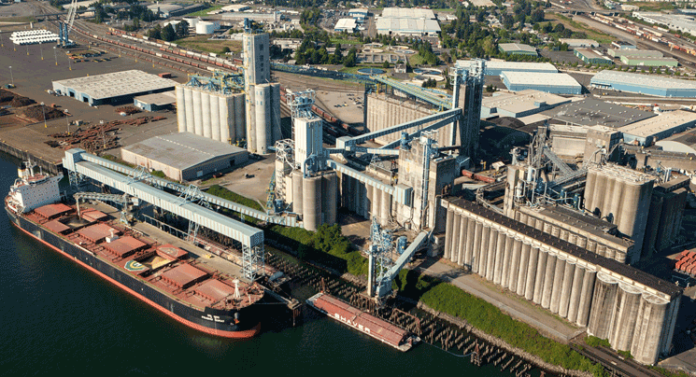With President Trump having promised to make significant changes to the United States’ trade agreements around the world, local exporters are trying to gauge how future policies could affect them and Southwest Washington’s economy.
Currently, Washington state is one of the country’s largest export hubs, exporting $86.3 billion in goods annually, according to the Department of Commerce. At the Port of Vancouver alone, the annual regional economic value of cargo handled at marine terminals and revenue generated by industrial tenants is $2.9 billion. At United Grain, a port tenant that exports commodities primarily to Asia, an estimated $1.5 to $2 billion in gross sales is generated annually.
While it is not entirely clear what the President intends to do with regards to trade (beyond his signing of an order to withdraw the country from the Trans-Pacific Partnership), any change in trade policy could significantly impact the state’s export numbers.
Augusto Bassanini, president and CEO of United Grain, said he is cautiously optimistic because President Trump appears to support policies intended to bolster the U.S.’ position in the global economy.
“He has a strong focus on selling U.S. goods overseas, bringing back production from overseas to the United States,” said Bassanini. “So certainly his attitude toward continuing to facilitate [the] export of U.S. products can only be good for our business, for our industry as we compete, in the global marketplace for agricultural products.”
One major policy shift the President has discussed is to either renegotiate or withdraw from NAFTA, the North American Trade Agreement, which facilitates trade between the United States, Canada and Mexico. As it stands, the agreement makes it much cheaper for goods to move between the three countries. Opponents of the deal argue that it expedited labor outsourcing by making it easier for American companies to build factories in Mexico where labor is cheaper, creating a jobs deficit at home.
But making significant changes to NAFTA and other trade policies is no simple task. Don Brunell, former president of the Association of Washington Business (AWB), said the new president needs to exercise caution.
“Trade agreements take years to negotiate and are carefully balanced,” wrote Brunell in a February column. “Scrapping NAFTA and imposing tariffs on Mexican and Canadian goods likely would trigger counter-tariffs imposed on U.S. products. The same goes for other international trade agreements.”
Brunell pointed out that NAFTA has proven to be particularly beneficial to Washington state’s agriculture industry. Since the agreement was implemented in 1993, agricultural exports to Mexico have doubled and increased by 44 percent to Canada, according to the U.S. Trade Representative’s office.
“It is always good to take a look at existing trade agreements, especially in our rapidly changing world,” added Brunell. “Modifications to those treaties should be carefully planned and negotiated with our trading partners, not hastily imposed by administration fiat.”
Abbi Russell, communications manager for the Port of Vancouver, added that while the port is monitoring the state of major trade deals, sanctions imposed on nations around the world also have significant effects on local trade.
“One of the biggest hindrances to trade is international sanctions imposed on various commodities by various countries,” she said. “We see huge sanctions being placed on wind energy towers and various steel products. Steel sanctions impact the Port of Vancouver as well as the ports of Houston and Los Angeles, which also move steel from Asia to the U.S.”
While the Trump administration has yet to “define their objectives” on trade, as one Mexican economy minister speaking to the New York Times and other reporters put it, it is certain that local exporters and agencies are paying close attention.
“Trade is a two-way street and no country gets all it wants,” advised Brunell. “Hopefully, there is a better deal for American workers by opening up NAFTA. President Trump just needs to be more measured in his rhetoric and methodical in our national approach.”
New sanctions and/or changes to trade deals would have significant effects on local trade, experts say.










